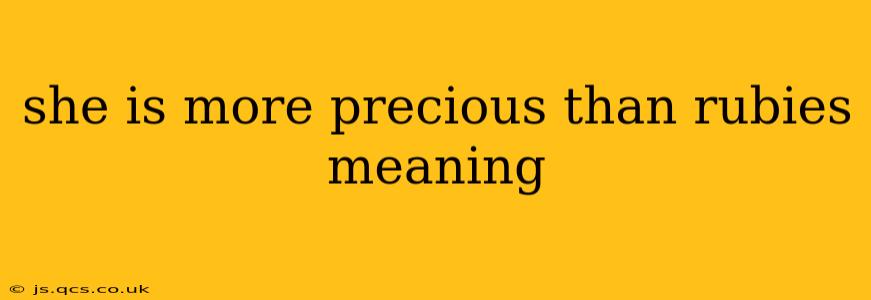The phrase "she is more precious than rubies" is a powerful declaration of immeasurable value and worth, often used to express deep affection and admiration for a woman. While seemingly simple, its meaning resonates deeply, drawing on cultural and biblical contexts to convey a profound sentiment. Let's delve deeper into its significance.
What Does "More Precious Than Rubies" Literally Mean?
Rubies, renowned for their intense red color and exceptional hardness, are among the most valuable gemstones. To say someone is "more precious than rubies" literally means they surpass the inherent value typically associated with these exquisite gems. This isn't a mere comparison of monetary worth, but rather a statement about intrinsic qualities that are far more valuable than material wealth.
Biblical Context: Proverbs 31:10
The phrase's most prominent origin lies in Proverbs 31:10: "A wife of noble character who can find? She is worth far more than rubies." This verse, part of a larger passage describing a virtuous woman, places the phrase within a framework of exceptional character and virtue. It's not simply about physical beauty or social status but about inner qualities that make a woman truly invaluable.
What qualities does this verse highlight?
The Proverbs 31 woman is industrious, compassionate, wise, and deeply respected within her community. She manages her household effectively, provides for her family, and demonstrates unwavering loyalty and faithfulness. These are the qualities that make her "more precious than rubies" – not superficial attributes but enduring virtues.
Beyond the Biblical Interpretation: Modern Meanings
While rooted in biblical text, the phrase's meaning transcends its religious origins. Today, it's frequently used to express:
- Deep Love and Affection: The phrase conveys an intense level of love and admiration, highlighting the irreplaceable value of a specific woman in someone's life.
- Exceptional Qualities: It can describe a woman who possesses outstanding characteristics, whether it be intelligence, kindness, strength, or resilience. These qualities are considered far more valuable than any material possession.
- Inestimable Worth: It emphasizes the inherent worth and dignity of a woman, asserting that her value cannot be quantified or measured by materialistic standards.
How is the phrase used in modern contexts?
The phrase might be used in:
- Romantic Expressions: A husband might tell his wife she's "more precious than rubies" to express his profound love and appreciation.
- Appreciation for a Woman's Strength: A friend might say it to a woman who has overcome significant challenges, highlighting her resilience and fortitude.
- Literary or Poetic Devices: Authors and poets might use the phrase to evoke a sense of deep affection, emphasizing the extraordinary qualities of a female character.
Is the phrase sexist or outdated?
The phrase's origins and frequent application to women might raise concerns about gender bias. However, the underlying message of celebrating inherent worth and exceptional qualities is not inherently sexist. The key is to appreciate the intended meaning—celebrating remarkable qualities rather than perpetuating traditional gender roles. In modern contexts, the focus should be on the qualities being praised, regardless of gender. The sentiment could equally be applied to a man or even another person.
In conclusion, the phrase "she is more precious than rubies" is a rich and multifaceted expression of profound value and affection. While originating in a biblical context, its meaning has evolved and continues to resonate across cultures and generations, highlighting the immeasurable worth of individuals possessing exceptional character and virtues.
